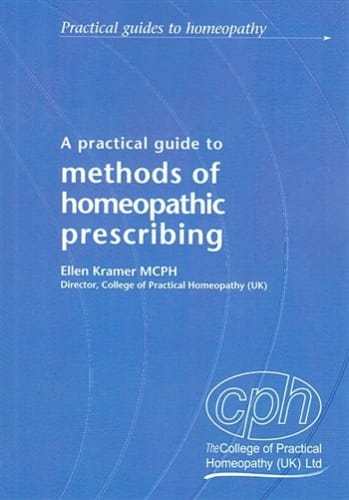This book is very competent exploration of the better tested methods used by homeopaths in clinical practice and is a good introduction to homeopathy. It provides an excellent grounding in the basic principles of homeopathy and how the different approaches used by homeopaths can be understood and used more effectively by practitioners. It covers the whole process from taking a case and a time-line, understanding and using methods appropriately to the use of repertories, therapeutics books and materia medicas and links succinctly with the 'laws of homeopathy' and the need for an understanding of nutrition and herbal tinctures. All of this is in a readable, logical, easy to follow style.
- Author: Ellen Kramer
- ISBN: 9780955555206
- 87 pages
- Paperback
- Published in 2010
- Printed in United Kingdom
Reprinted with the permission of The Alliance of Registered Homeopaths, from the Journal 'Homeopathy in Practice', Winter 2007 edition. Reviewed by Lee Pollack.
This book is more than the title suggests. Whether this is advantageous or not depends on why you might want to buy it. I expected it to be an updated version of Ian Watson's A Guide to the Methodologies of Homeopathy the first edition of which is now 16 years old. Interestingly both books include acknowledgements to Robert Davidson and Robin Murphy, among others.
The Watson book is, as the title suggests, a descriptive account of some 15 different homeopathic methods including brief historical context and case examples. The Kramer book includes many of the same methods, plus newer ones such as Singh and bowel nosodes, and it also seeks to place multi-method prescribing within the context of homeopathic philosophy, quoting from Hahnemann and Herring. There is an implicit dialogue with the narrower definitions of 'classical' homeopathy. Inasmuch as this dialogue exists within the homeopathic community the Kramer book is an important contribution to this debate, although not necessarily what I wanted from a methods book.
There is also a chapter on case taking, which might be useful to students but again not something I was expecting to find in a book of this title. This raises the question of who is the audience for this book? Students may find it useful, particularly those studying at particular colleges. The section on methods is clear and concise with a useful distinction between 'whole patient methods' and 'part-patient methods'. Each method contains bullet points on when to use the method and how to prescribe it. The Watson book is more discursive and includes case examples which I find helpful.
There is an emphasis on the part-patient methods. This comes from Kramer's experience that, while 80% of disease may come from the mental/ emotional life of a person (according to Dr Elmiger, a Swiss homeopath and author of Rediscovering Real Medicine Vega, 2001), only 20% of her cases respond to whole patient methods because of suppression by western medicine. In my experience the figure is somewhat higher. But that is simply my experience and one of the purposes of this book is to argue for the inclusion of many methods within homeopathy. If you are interested in a variety of 'detox methods' there are several here. I have found that homeopathic remedies generally have this effect. As Robert Davidson says in the forward, 'No method will work on every patient'.
There is then a section on 'practical homeopathy'. Again I am not sure of the intended audience for this. It does seem a little odd, having made a very persuasive case for including multi-method prescribing within the remit of homeopathy, to go on to create a sub-group of 'practical homeopathy'. If there is an implicit dialogue with classical homeopathy in this book perhaps practical homeopathy represents the polarity, a concept we are accustomed to in homeopathy. The definition of a 'practical homeopath' is given as 'someone who has been trained to be able to use a number of different ways to approach a patient's case'. I would appeal to the greater unity that contains the polarities and call this a homeopath.
If you are looking for a methods book, have a look at this book and at Ian Watson's book and see which style you prefer. And if you are looking for useful arguments in favour of including multi-method prescribing within the domain of homeopathy there are some salient points in the Kramer book.

